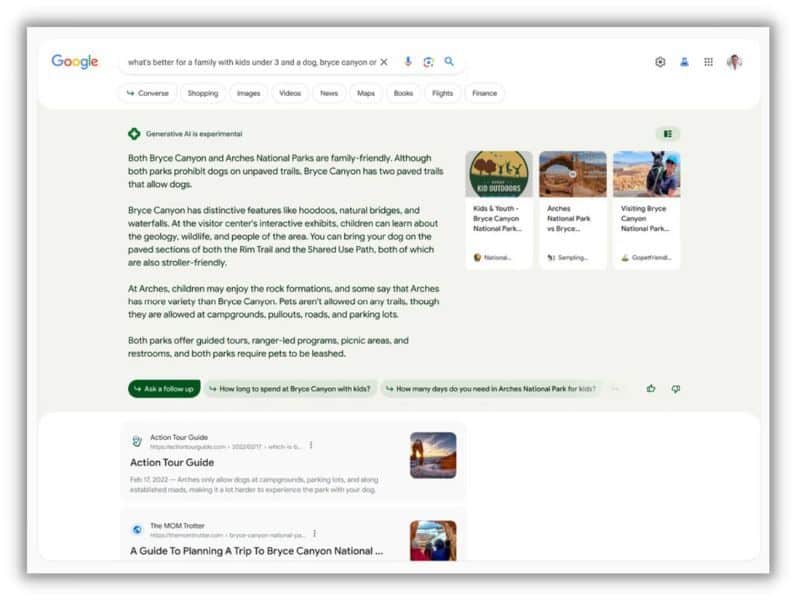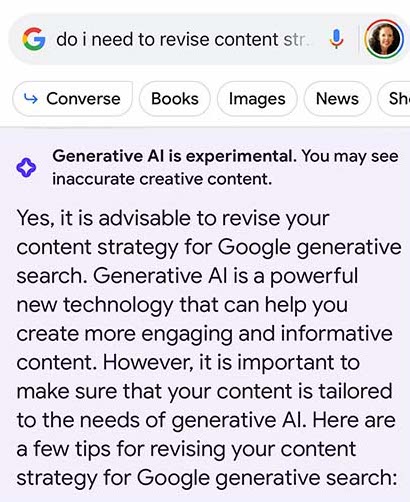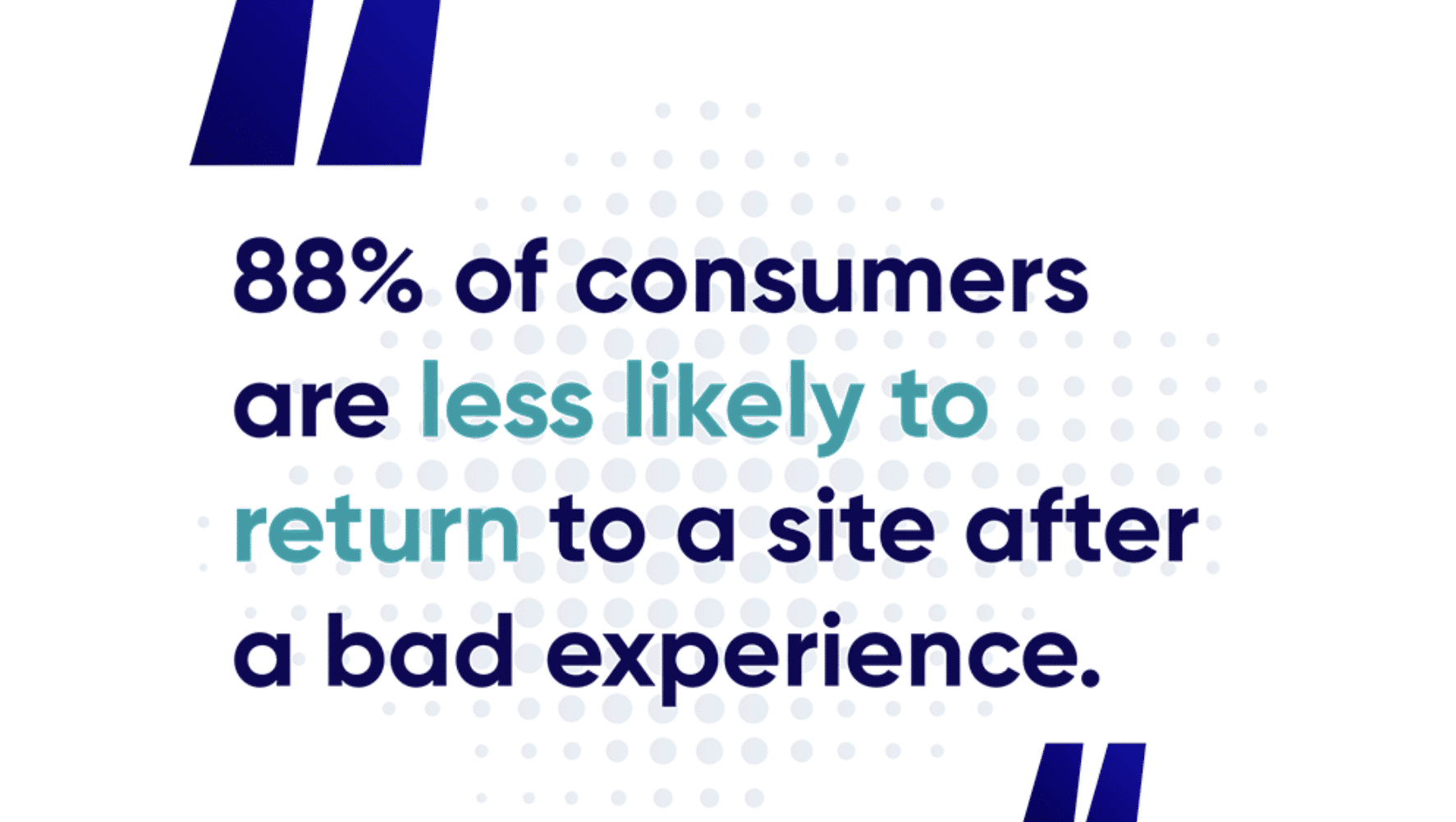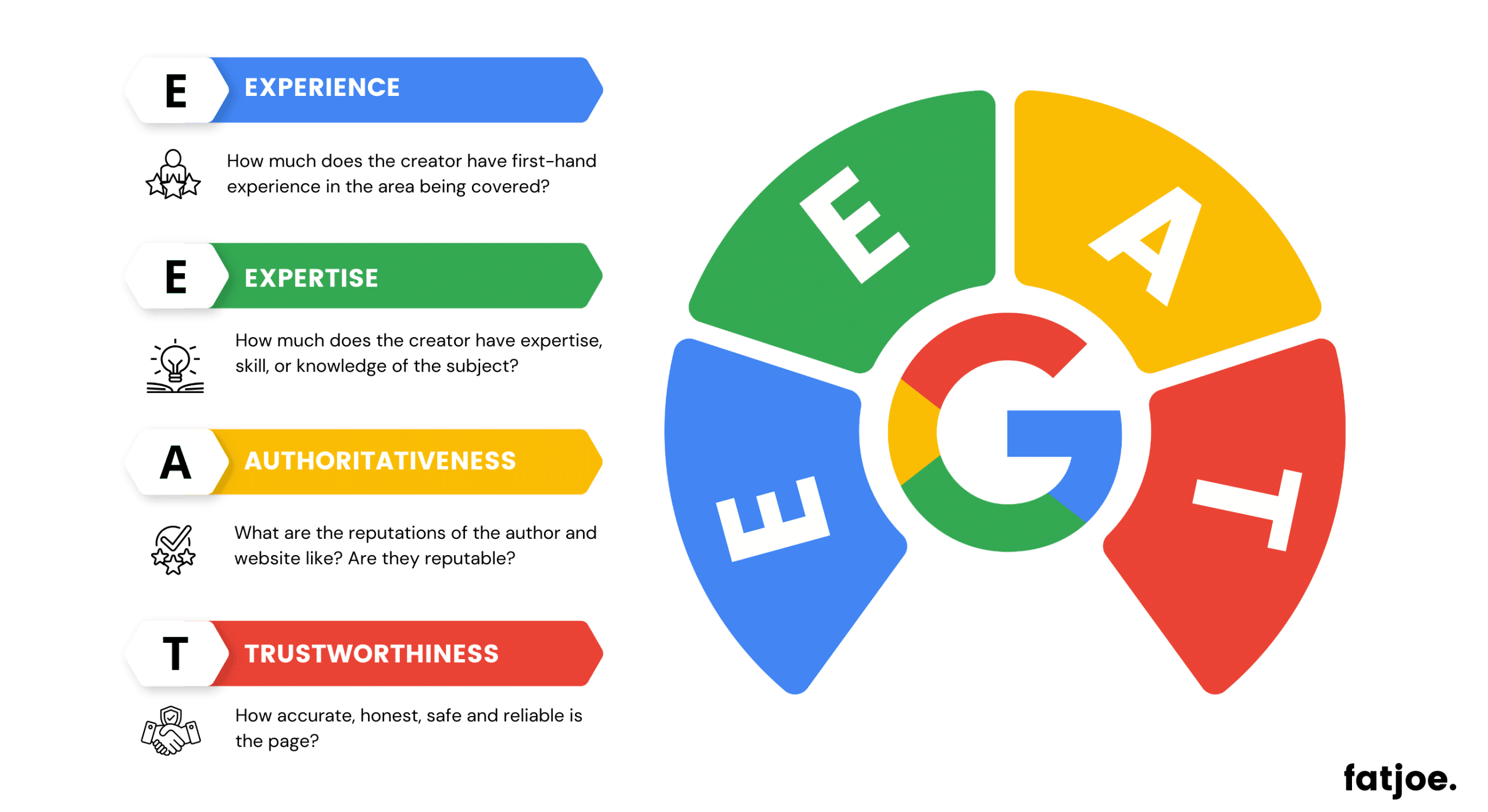
How Google’s Search Generative Experience (SGE) Impacts Content Marketing
Google’s gearing up to redefine how we experience search. Gone are the days of merely matching keywords; the tech giant is now leaning into the power of artificial intelligence to truly understand and cater to what users are seeking.
Through its testing of the Search Generative Experience (SGE) and other AI advancements, Google is championing a more interactive and natural search process. With SGE, not only can we expect concise topic summaries at our fingertips, but we’ll also be able to engage in dynamic, conversational modes.
For us in the B2B sector, there’s a clear message: Content that embodies Google’s E-E-A-T principles will be in the spotlight. It’s a call to action for content creators to dive deeper, ensuring our content is not just informative, but also rich in experiential depth and backed by authoritative support.
In this post, we’re covering everything you need to know about Google’s search generative experience and content marketing so you can keep creating content that converts.
Quick Takeaways
- Google’s search generative experience is evolving from basic keyword matching to AI-driven algorithms that predict results based on user behavior, context, and sentiment.
- Content marketing in the age of generative search emphasizes understanding user intent, requiring content to be both keyword-rich and intent-rich.
- Practical implications for content marketers highlight the need for evolved SEO strategies, diverse content formats, quality over quantity, and a strong user experience.
- The future of generative search and content marketing will be shaped by AI personalization, voice search, visual search, ethical algorithm considerations, and the necessity for continuous adaptation.
What is Google’s Search Generative Experience?
We’ve all witnessed the rapid evolution of search engines. From basic keyword matching to sophisticated algorithms, the journey has been nothing short of revolutionary.
But what’s the latest buzzword making waves in the search realm? Google’s Search Generative Experience.
Video Source: Google
So, what exactly is a generative experience in the context of search? It’s about using advanced algorithms, often powered by artificial intelligence (AI), to enhance the search experience. Instead of just matching keywords, these algorithms generate or predict search results based on factors like:
- User behavior
- Context
- Domain authority
- Freshness of content
- Sentiment
As a user, you might have noticed more intuitive search suggestions when you start typing a query. Or maybe you’ve been pleasantly surprised when Google seems to understand the context behind your search, even if you’ve left out a keyword or two.

Image Source: Google
That’s the generative experience in action. Google is no longer just a search engine; It’s evolving into a solution engine, aiming to provide the most relevant and contextual answers to our queries.
But why should we, as professionals, care about this? Because the benefits are manifold. For users, it means a more seamless and efficient search experience. For businesses, especially those in the B2B sector, it means we need to be more strategic with content. If Google is striving to understand user intent better, then we need to ensure our content aligns with that intent.
Generative Search and Content Marketing
It’s no secret that search engines, especially giants like Google, play a key role in shaping the visibility and reach of our content. But with the introduction of generative search, the game is changing, and we need to understand how to adapt our content accordingly.
First, let’s demystify what generative search means for content marketing. When search engines use generative algorithms, they’re not just looking for keyword matches. They’re actively trying to understand the intent behind a user’s query. This means that the content we produce should not just be keyword-rich, but also intent-rich. We need to ask ourselves:
- What is the user truly seeking?
- How can our content best address that need?
Now, think about the ripple effects of this on content visibility. If a search engine can generate results based on a user’s behavior, context, and other factors, then traditional SEO tactics might not cut it anymore.
Instead of focusing solely on keywords, we need to dive deeper into understanding our audience’s journey, pain points, and aspirations and create content that:
- Resonates
- Informs
- Engages
But there’s a silver lining for content marketers. If search engines are getting better at understanding and predicting user intent, they can also guide us in creating content that’s more aligned with what our audience is genuinely looking for.
The key takeaway is this: With generative search in play, there’s an increased emphasis on the quality and authenticity of content. You can’t rely on surface-level articles stuffed with keywords. Depth, expertise, and genuine value are pushing content creators to up our game and produce material that truly stands out.
The Real Implications for Content Marketers
The content marketing rulebook is being rewritten. For those of us in the B2B sector, understanding these changes and adapting our strategies isn’t just beneficial. It’s essential.
Let’s explore the practical implications of this new search landscape and how we can navigate it effectively.
1. Rethinking SEO Strategies
You may need to rethink your SEO strategy. While traditional SEO is still relevant, make sure you’re focusing on more than just keywords. Now, it’s all about context and content.

Image Source: Hill Web Creations
Shift your focus from optimizing for search engines to genuinely understanding and addressing your audience’s needs. Ask yourself, “What problems is my audience trying to solve?” and tailor your content accordingly.
2. Engage and Interact
Engagement metrics can greatly influence how your content is ranked. Encourage interactions on your content, be it through comments, shares, or feedback. Engaging with your audience not only boosts visibility, but also provides invaluable insights into their preferences and needs.
3. Diversify Your Content Portfolio
Generative search recognizes and rewards various content formats, whether it’s:
- Blog posts
- Videos
- Infographics
- Podcasts
- Case Studies
Diversifying the formats you use can cater to different audience preferences and increase the chances of your content being surfaced in search results.
4. User Experience (UX) Matters
Generative search takes into account the overall user experience on a webpage, and so should you. Not only are 88% of users less likely to return to a site after a bad experience, but every $1 invested in UX results in a return of $100. That’s an ROI of 9,900%.

Image Source: Site Improve
Clearly, a seamless UX is crucial. This means we need to make sure our content is not only valuable, but also presented in a user-friendly manner through:
- Mobile optimization
- Fast loading times
- Intuitive site navigation
- Consistent layout and design
- Search functionality
5. Stay Updated
When your audience lands on your page, they’re looking for current and accurate information. This means that outdated information will harm your credibility and ranking.
Prioritize regularly updating your content to ensure it remains relevant and accurate. By revisiting and refreshing older articles, blog posts, or research studies, you not only maintain your credibility, but also signal to search engines that your content is timely and relevant.
6. Quality Over Quantity
At MIG, we’re always preaching about quality over quantity, but now it’s more important than ever. With generative search algorithms prioritizing content that aligns with user intent, it’s crucial to prioritize depth and value in our content.
Instead of churning out multiple pieces that skim the surface, invest time in creating comprehensive, insightful content that truly addresses the pain points of your audience. If your content already abides by Google’s E-E-A-T requirements, you’re already one step ahead.

Image Source: Fat Joe
7. Build Authentic Relationships
Backlinks remain a significant factor in search rankings. However, with generative search, the quality of these links matters even more than before. Focus on building genuine relationships with reputable sites in your industry, and prioritize organic, meaningful backlinks over sheer numbers.
The Future of Search Generative Experience and Content Marketing
As we stand at the crossroads of technological advancements and changing user behaviors, it’s only natural for us to wonder what’s next for the search generative experience and content marketing.
While we can’t claim to have a crystal ball, we can certainly make educated predictions based on current trends and insights. Let’s explore the possible future of our industry.
- AI-Driven Personalization. As AI continues to mature, we can expect search engines to offer even more personalized search results. For us in the B2B sector, this means crafting content that can adapt and resonate on a deeply personal level.
- Voice Search Dominance. With smart speakers and voice-activated assistants, voice search is positioned to become a dominant mode of search. We’ll need to optimize our content not just for typed phrases, but also for spoken ones, considering the nuances and natural language patterns of voice queries.
- Visual and Augmented Reality Search. As technology advances, search won’t be limited to text. Users might soon be searching using images or through augmented reality interfaces. This shift will challenge us to think beyond traditional content and explore more visual and interactive formats.
- Ethical Considerations. As algorithms become more sophisticated, there will be increased scrutiny on their transparency. We might see regulations ensuring that AI-driven search results are unbiased and ethical. As content creators, staying informed and compliant will be crucial.
- Continuous Learning and Adaptation. The pace of change will only accelerate. Continuous learning, upskilling, and adaptability will become non-negotiable traits for success in content marketing.
While we can’t predict every twist and turn, we can prepare, adapt, and innovate. By staying informed, agile, and open-minded, we position ourselves to not just navigate, but lead the future of the search generative experience and content marketing.
Conquer the Search Generative Experience and Content Marketing Today with Marketing Insider Group
Navigating the content marketing landscape has never been easy, but with Google’s Search Generative experience, the stakes have been raised.
As we’ve discussed, this new frontier in search technology is reshaping how we approach content creation, optimization, and engagement. For B2B professionals, it’s a clarion call to be more adaptive, insightful, and forward-thinking.
Are you ready to publish high-quality content consistently? Check out our SEO Blog Writing Service or schedule a quick consultation to learn more about how Marketing Insider Group can help you earn more traffic and leads for your business.






